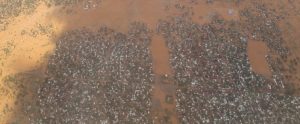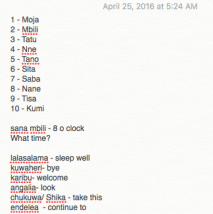BHER TA HaEun Kim writes about her experience teaching students in Dadaab.
.
The first time I had heard about Dadaab was in Don’s (my supervisor) office. I had approached him in the fall to work with a project called Success Beyond Limits when he mentioned BHER. I listened politely. Higher education for refugees? In the world’s largest refugee camp? I was intrigued, but what he was telling me was so removed from my reality that I couldn’t really grasp the impact of the work BHER did. At that moment, it was a passing piece of information about an interesting project. I never thought that a couple months later, I’d be flying out to Dadaab to work as a TA.

At the beginning of April I stepped off a plane and found myself in a sweltering semi-arid desert, working in a heavily securitized space- an environment that was unlike any I had ever encountered before. But work goes on and you cope with the heat, brush off the dust (literally), follow the new rules and routines. A different challenge was learning to maneuver relationships with people. As a Korean immigrant who grew up Toronto, teaching in Northeast Kenya meant I was working with students and staff of different languages, customs, and cultures. Unlike Hawa who was raised by Somali parents and familiar with most of the cultural nuances of the people and space, I came from a very different background. We were strangers to each other, but as the weeks progressed, the gap began to lessen. There are things that speak to people beyond a mutual language and culture. Things like making the effort to listen, even if you don’t fully understand everything. Or having a authentic interest in someone’s well-being. Taking the time to remember names, receive smiles, say hello. Making an effort to be a genuine— this speaks volumes when you can’t say much else.
 But of course language communicates so much more, so I decided to try and learn Swahili while I was in Dadaab and it became a point of connection for me. I told the students that they were my teachers and they would take my phone, write Swahili words with English translations or record pronunciations for me. Some of my teachers were strict, others more patient. I caught glimpses of their personalities and I’m sure they saw some of mine— it was cause for moments of fun during class.
But of course language communicates so much more, so I decided to try and learn Swahili while I was in Dadaab and it became a point of connection for me. I told the students that they were my teachers and they would take my phone, write Swahili words with English translations or record pronunciations for me. Some of my teachers were strict, others more patient. I caught glimpses of their personalities and I’m sure they saw some of mine— it was cause for moments of fun during class.
There were ups and downs, but looking back, Hawa and I both realized our time in Dadaab had been very special. Having made new friends, we were thankful for the stories, laughs, and memories. But we’re encountering these connections in different ways. Reports, books, and research articles on encampments, refugee education etc. following the trip weigh more heavily because of the people we had come to know. I hope that moving forward, these connections will help me to become a better support to our students’ journey in their learning.